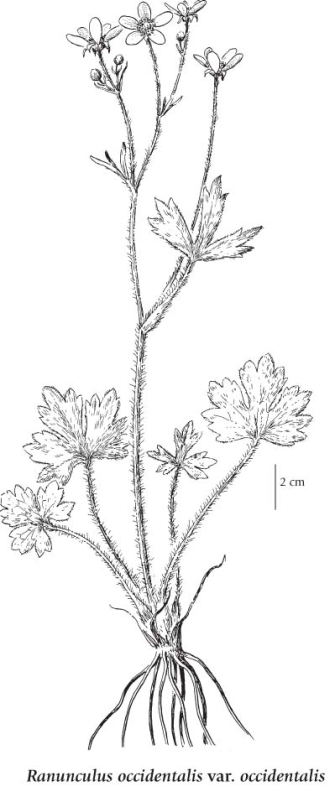Click on the image below to view an
expanded illustration for this species.

|
General:
Perennial herb from a cluster of fibrous roots; stems 1 to several, erect or nearly so, 15-40 (60) cm tall, more or less hollow; plants variously hairy.
Leaves:
Basal broadly egg-shaped or semi-circular to kidney-shaped, the blades deeply 3-lobed or -parted, 1.5-5.5 cm long, 2-8 cm wide, the segments 1- to 2-times incised, the ultimate segments oblong or elliptic to oblanceolate or lanceolate, toothed, tips pointed to rounded, the stalks long, 1 to several times the length of blade; stem leaves alternate, more deeply dissected, shorter-stalked, transitional to the 3- to 7-parted lower bracts and entire upper bracts.
Flowers:
Inflorescences few- to many-flowered cymes terminal on main stem and branches; flower stalks to 10 cm long; receptacle smooth; petals 5 (6-14), distinct, yellow, oblong to narrowly egg-shaped, 5-13 mm long, 1.5-8 mm wide, nectary on upper surface, the nectary scale smooth, almost 1 mm long; sepals 5, bent back 2-3 mm from base, early deciduous, greenish or pinkish-tinged, 4-7 mm long, 2-4 mm wide, long stiff-hairy; stamens 30-60; pistils 5-20.
Fruits:
Achenes, several to many in a hemispheric head 3-7 mm long, 5-9 mm wide, the achenes egg-shaped, 2.6-3.6 mm long, 1.8-3 mm wide, smooth, rarely stiff-hairy, margins prominent, not keeled; beaks persistent, lanceolate- to awl-shaped, somewhat flattened, 0.4-2.2 mm long, straight or curved.
Notes:
This highly variable species is often separated into numerous infraspecific taxa (Benson 1948, Scoggan 1978, Brayshaw 1989, Whittemore 1997). The treatment by Benson (1948) is unacceptable for our BC material (see Calder and Taylor 1968). It is also interesting to note that some authors fail to recognize varieties when annotating specimens (especially BC material) in major herbaria, even though they provide keys to varieties in their texts. This may be due to the fact that herbaria specimens are often intermediate between the recognized extremes.
|

